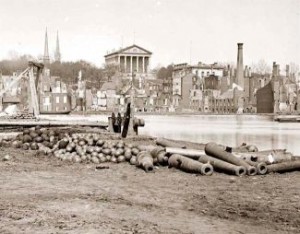It is Sunday, a day of worship for some Baptist congregations in the Confederacy. While the intrusion of war or the infrequency of worship (many rural churches gather only once a month) prevent many congregations from assembling, morning services at the First Baptist Church of Atlanta proceed smoothly, as a member of the congregation notes in his diary today.
The usual services in our church this morning but at night it rained and our choir sat down stairs but notwithstanding, the audience was fair.
In the Confederate capital of Richmond, Virginia however, church life is noticeably impacted by the war. Some Baptist churches are now serving as Confederate hospitals, their congregations disbanded or meeting in other locations. And one Baptist church in particular is the subject of controversy following the recent Bread Riot in the city.
The Belvidere Baptist Church remains rattled by its role in the disturbance earlier this month. Recent stories published in Richmond newspapers, and then reprinted northward in the New York Times, reveal the extent of damage control that civic and religious leaders are involved in in efforts to downplay public unrest in Richmond.
From the Richmond Sentinel 7th.
When the public peace was for a time somewhat disturbed here on Thursday last, it was suggested to us, and to the rest of the city Press, by many citizens, to refrain from any present notice of it, on account of the misrepresentations and exaggerations to which a publication would give rise. In assenting to the suggestion, in company with all the other papers, we felt that we were only paying a decent respect to the opinions of gentlemen certainly as well qualified to judge as ourselves, equally interested, to say the least, in a correct judgment, and entitled to deference on other grounds.
It can now be said upon authority of the sworn evidence, that the conduct of the few misguided women who, on Thursday, availed themselves of the tenderness with which their sex is ever treated in the South, was not due to suffering. Themselves and the thieves in pantaloons who took shelter in their company, simply plundered; milliner’s goods, dry goods, fancy goods, &c., fully as much as more necessary articles. It was no cry for bread. It was no hunger riot; so far as they placed their action on any declared basis, it was opposition to the high, prices. And upon this point they took shelter under the abstract sympathy of such as believe that speculators and extortioners have made the prices so high and dispose them accordingly. But it is now proven that there was no distress among those persons; that the very leader was independent, and herself an extortioner; that there has been abundant provision made for the poor who may need it; and that the whole thing was simply a plundering raid, under female impunity. An ebullition such as we have noticed would have excited no attention outside of the quiet South, where good order is so uniform and so universal. It amounts to nothing here.
From the Richmond Whig, April 8.
Rev. W.H. FOUERDEN, pastor of Belvidere Hill Baptist Church, publishes an explanation in regard to the riotous assemblage of women which, last week, disturbed our city. The meeting of females having been organized at that church, on Oregon Hill, Mr. FOUERDEN says the women first tried to get the Methodist Meeting-house on Oregon Hill to hold their meeting in, but the sexton refused to allow them to hold it there.
The women then applied to the person having the key of the Belvidere Church, and, in his absence from home, it was given them without it being known for what object the meeting was called. The whole story will get into print if they keep on. It now appears that prior to their marching through the streets they held a meeting at the Baptist Church, and determined to hare bread for themselves and little ones or get up a riot and sack the stores and warehouses, which they did, as per statement of Col. STEWART.
Sources: Samuel Pearce Richards, edited by Wendy Hamand Venet, Sam Richards’s Civil War diary: a Chronicle of the Atlanta Home Front, Athens: University of Georgia Press, 2009, p. 173 (link); “The Cry for Bread,” New York Times, April 19, 1863 (link)



